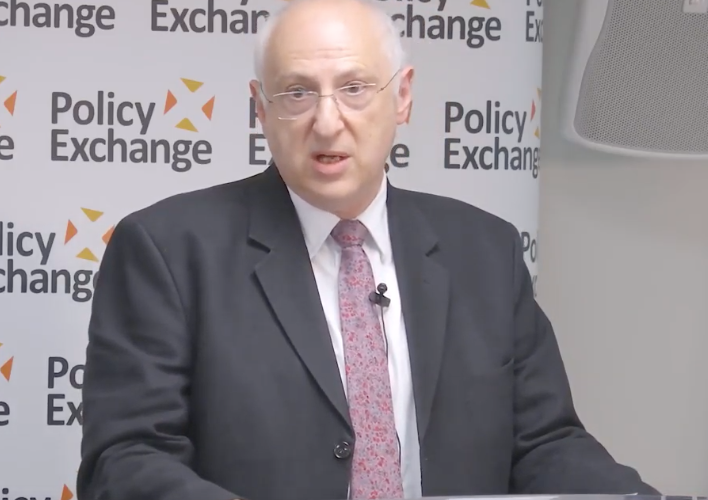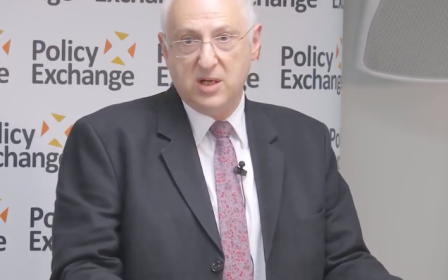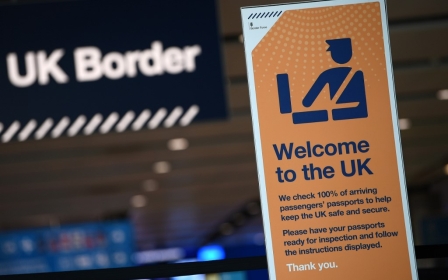UK government drops Lord Carlile as Prevent reviewer after legal challenge

The UK government has conceded a legal challenge over its appointment of a vocal advocate of the Prevent strategy to review the controversial counter-terrorism policy by withdrawing his appointment.
In a letter on Thursday to Rights Watch (UK), a human rights group which Middle East Eye first reported was set to challenge Lord Carlile's appointment in a judicial review, the government said that Carlile would no longer be conducting the Prevent review.
“It is made clear at the outset that the government has full confidence that Lord Carlile has carried out the review to date with rigour and an open mind; and the decision not to defend the proceedings in no way calls into question his integrity or fair-mindedness. However, his appointment has been concluded," the letter said.
Rights Watch (UK) had intended to argue that Carlile's appointment was unlawful because he could not be considered independent due to his public support for and involvement in the delivery of the Prevent strategy.
“This is an outstanding victory for those who are committed to seeing a genuine and robust review of the Prevent strategy,” said Yasmine Ahmed, executive director of Rights Watch UK.
New MEE newsletter: Jerusalem Dispatch
Sign up to get the latest insights and analysis on Israel-Palestine, alongside Turkey Unpacked and other MEE newsletters
“Our concerns with Lord Carlile have always been clear, and well-evidenced. His long-standing objection to any kind of criticism or overhaul of Prevent is no secret and he has a track record of discrediting those who raised concerns about Prevent."
What is the Prevent Strategy?
+ Show - HidePrevent is a programme within the British government's counter-terrorism strategy that aims to “safeguard and support those vulnerable to radicalisation, to stop them from becoming terrorists or supporting terrorism”.
It was publicly launched in the aftermath of the 2005 London bombings and was initially targeted squarely at Muslim communities, prompting continuing complaints of discrimination and concerns that the programme was being used to collect intelligence.
In 2011, Prevent's remit was expanded to cover all forms of extremism, defined by the government as “vocal or active opposition to fundamental British values, including democracy, the rule of law, individual liberty and mutual respect and tolerance of different faiths and beliefs.”
In 2015, the government introduced the Prevent Duty which requires public sector workers including doctors, teachers and even nursery staff to have “due regard to the need to prevent people being drawn into terrorism”.
A key element of Prevent is Channel, a programme that offers mentoring and support to people assessed to be at risk of becoming terrorists. Prevent referrals of some young children have proved contentious. 114 children under the age of 15 received Channel support in 2017/18.
Criticism of the Prevent Duty includes that it has had a “chilling effect” on free speech in classrooms and universities, and that it has turned public sector workers into informers who are expected to monitor pupils and patients for “signs of radicalisation”. Some critics have said that it may even be counter-productive.
Advocates argue that it is a form of safeguarding that has been effective in identifying and helping troubled individuals. They point to a growing number of far-right referrals as evidence that it is not discriminatory against Muslims.
In January 2019 the government bowed to pressure and announced that it would commission an independent review of Prevent. This was supposed to be completed by August 2020. After being forced to drop its first appointed reviewer, Lord Carlile, over his past advocacy for Prevent, it conceded that the review would be delayed.
In January 2021 it named William Shawcross as reviewer. Shawcross's appointment was also contentious and prompted many organisations to boycott the review. Further delays followed. Shawcross's review, calling for a renewed focus within Prevent on "the Islamist threat", was finally published in February 2023 - and immediately denounced by critics.
Ahmed said the appointment of a new reviewer needed to be open and transparent in order to win the confidence of communities affected by the strategy.
Following his appointment in August, MEE reported that Carlile was a member of the Prevent Oversight Board which sits within the Home Office and is responsible for enforcing the implementation of Prevent work by public bodies.
In a debate in the House of Lords last December, Carlile said that he had “played a part” in the creation of the current iteration of the strategy, and questioned whether there was a public interest in an independent review.
He also suggested that the role should fall within the remit of the existing independent reviewer of counter-terrorism legislation, saying that the work would be a matter of a “few extra days”.
The government agreed to commission an independent review of Prevent as part of legislation contained within this year’s Counter-Terrorism and Border Security Act that was passed by parliament in response to widespread criticism of the strategy among rights groups and Muslim advocacy organisations.
The Home Office will now also look again at the terms of the reference of the review, which Rights Watch (UK) had also intended to challenge in the judicial review.
"Serious questions and issues were left ignored by the potential review under Lord Carlile. This is an opportunity to right that wrong,” said Ahmed.
The government's move was also welcomed by the Muslim Council of Britain, an umbrella group of Muslim organisations.
“We have long advocated a robust, wide-ranging and objective review of this strategy that has left Muslims feeling demonised, targeted and spied on," said Harun Khan, secretary general of the MCB.
"The Government should now look further afield to find a reviewer truly independent enough to lead a review of Prevent that fosters trust amongst supporters and critics alike.”
Carolin Ott, a lawyer at Leigh Day which helped Rights Watch (UK) to bring its case against the government, said: “It is regrettable that it has taken the threat of a court hearing and a delay of over four months for this concession to be made. However, we hope that reconsideration of the independent reviewer and approach to the terms of reference will lead to a much needed, rigorous and thorough review of the controversial Prevent strategy.”
A Home Office spokesperson said: "We are not contesting this legal challenge. The next steps for the review will be considered in due course. We would like to thank Lord Carlile for his work on the review so far and for his continued contribution to security and counter-terrorism.”
Middle East Eye delivers independent and unrivalled coverage and analysis of the Middle East, North Africa and beyond. To learn more about republishing this content and the associated fees, please fill out this form. More about MEE can be found here.




